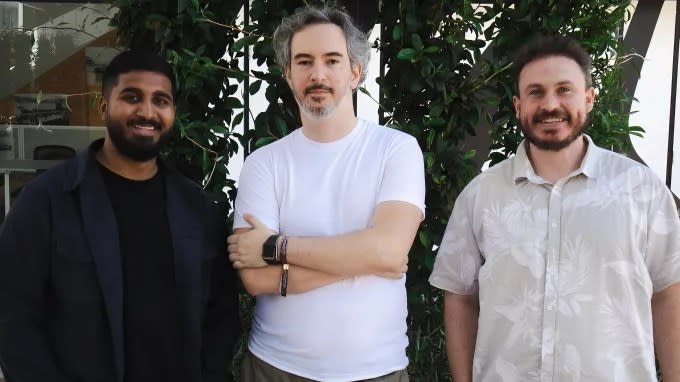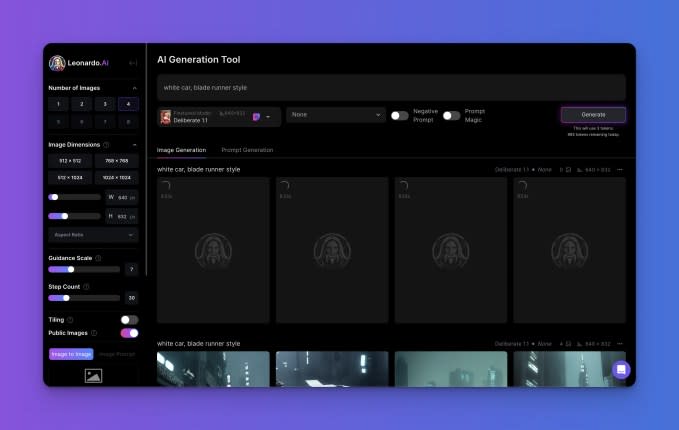Canva acquired Leonardo.aia generative AI search and content startup, as the company seeks to deepen its investment in its AI technology stack.
Financial terms of the deal were not disclosed, but Canva co-founder and chief product officer Cameron Adams said it is a mix of cash and stock. All 120 Leonardo.ai employees will join Canva, including the executive team.
“Leonardo will continue to operate independently from Canva, focusing on rapid innovation, research and development, now supported by Canva resources,” Adams told TechCrunch. “We will continue to offer all of Leonardo’s existing tools and solutions. This acquisition aims to help Leonardo develop its platform and deepen its user growth with our investment, including expanding its API business and investing in foundational model R&D.”
Sydney-based Leonardo.ai, founded in 2022, was originally planned to focus on creating video game assets. (The startup’s founders met while working at a video game company.) But then the Leonardo.ai team decided to build the platform to serve more scenarios, like creating and training AI models for image creation in industries like fashion, advertising and architecture.
Today, Leonardo.ai offers collaboration tools and a private cloud for models that include video generators, as well as access to APIs that allow customers to build their own technology infrastructure based on the Leonardo.ai platform.

Leonardo.ai sets itself apart from other AI generative art platforms by the amount of control it offers users, co-founders Jachin Bhasme, JJ Fiasson and Chris Gillis told TechCrunch in an interview last December. For example, Leonardo.ai’s Live Canvas feature allows users to enter a text prompt and then quickly sketch what they want the end result to look like. As the user draws, Leonardo.ai creates a photorealistic image based on text and sketch in real time.
It’s unclear how Leonardo.ai trains its internal generative models, like its flagship Phoenix model, an important question to ask about any generative AI service given the legal ramifications of training models on copyrighted content without permission. We’ve reached out to clarify and will update this post if and when we hear back.
Canva itself has been relatively supportive of creators in adopting generative AI, committing $200 million over the next few years to pay creators who consent to their content being used to train the company’s AI models.
Massive growth
Leonardo.ai has over 19 million registered users and its tools have been used to create over a billion images.
Adams says Leonardo.ai, which managed to raise more than $38.8 million in capital from backers including Smash Capital, Blackbird, Side Stage Ventures, TIRTA Ventures, Gaorong Capital and Samsung Next prior to the acquisition, will help contribute to A.I. generative tool from Canva’s Magic Studio. suite.
“We will be looking to integrate Leonardo technology into Magic Studio, which we are very excited about,” said Adams. “This could include making existing Magic Studio tools more powerful or introducing new generative AI capabilities powered by Leonardo’s models directly into Canva. It’s still early days and we’ll meet immediately to determine what this looks like, but we’re excited to expand what our users can do with AI on Canva.”
Canva has been investing in generative AI tools since December 2022, starting with copywriting assistant Magic writing. But – with an eye on an IPO – it has intensified its development efforts in recent months through internal projects and acquisitions. In February 2021, Canva acquired Kaleido, creators of a drag-and-drop background removal service for images and videos. Adams says Kaleido laid the groundwork for many of Canva’s latest generative AI efforts.


Leonardo.ai is Canva’s eighth acquisition overall and second acquisition of the year, coming three months after purchasing the UK design company Affinity for around US$380 million. Canva also owns presentation startup Zeetings, free photography sites Pixabay and Pexels, and Czech Republic-based product mockup app Smartmockups.
Canva, which was founded in 2012, has raised more than $560 million (most recently at a $26 billion valuation), is earning close to $2 billion in revenue, and has more than 180 million monthly users across the world.
“It’s a significant but natural next step in our efforts to build the most powerful and complete visual AI offering,” said Adams. “We’ve placed a strong focus on building an AI-powered workflow that includes generative solutions like image generation and design. Combining this Canva workflow with new generative capabilities will help us continue to differentiate our AI offering and offer new possibilities for the growing base of teams and companies using Canva.”





















/cdn.vox-cdn.com/uploads/chorus_asset/file/25551815/Leonardo_homepage.png?w=300&resize=300,300&ssl=1)












